BTEC HND Business: Human Resource Management Report on M&S
VerifiedAdded on 2023/04/21
|13
|5189
|258
Report
AI Summary
This report provides a comprehensive analysis of Human Resource Management (HRM) practices, focusing on the application of Guest's model to Marks & Spencer (M&S), a UK-based retail organization. The report explores the differences between Storey's definition of HRM, personnel, and Industrial Relations (IR) practices, and assesses the implications of developing a strategic approach to HRM for line managers and employees. It also examines the implementation of flexible working practices, considering both employee and employer perspectives, and discusses the impact of changes in the labor market. Furthermore, the report addresses various forms of workplace discrimination, the practical implications of equal opportunities legislation, and compares approaches to managing equal opportunities and diversity. The report also identifies and compares performance management systems, assesses approaches to managing employee welfare, discusses health and safety legislation, and evaluates the impact of other topical issues on HRM practices. The analysis provides a detailed overview of HRM strategies, challenges, and best practices within the context of a real-world business case study.
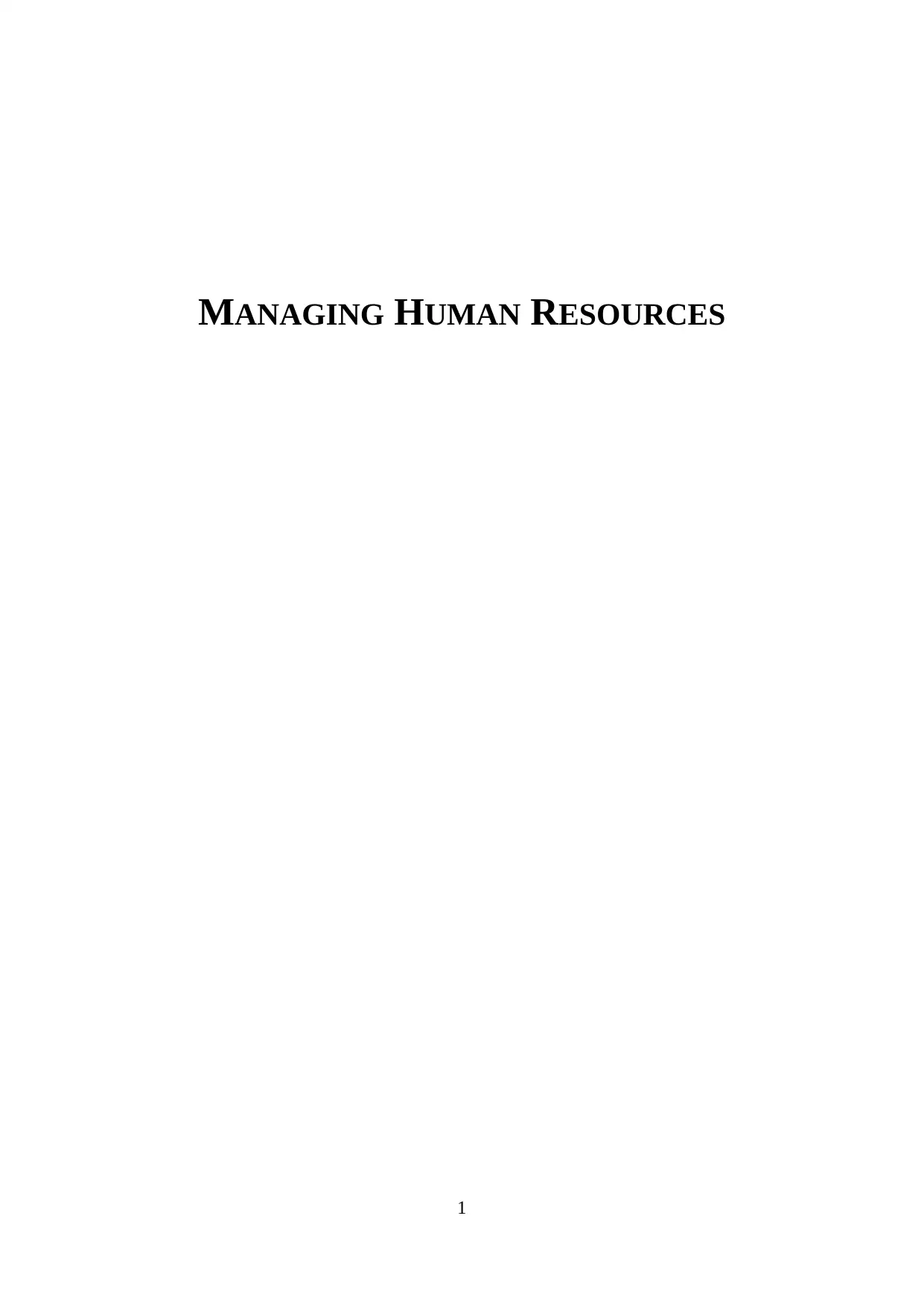
MANAGING HUMAN RESOURCES
1
1
Paraphrase This Document
Need a fresh take? Get an instant paraphrase of this document with our AI Paraphraser
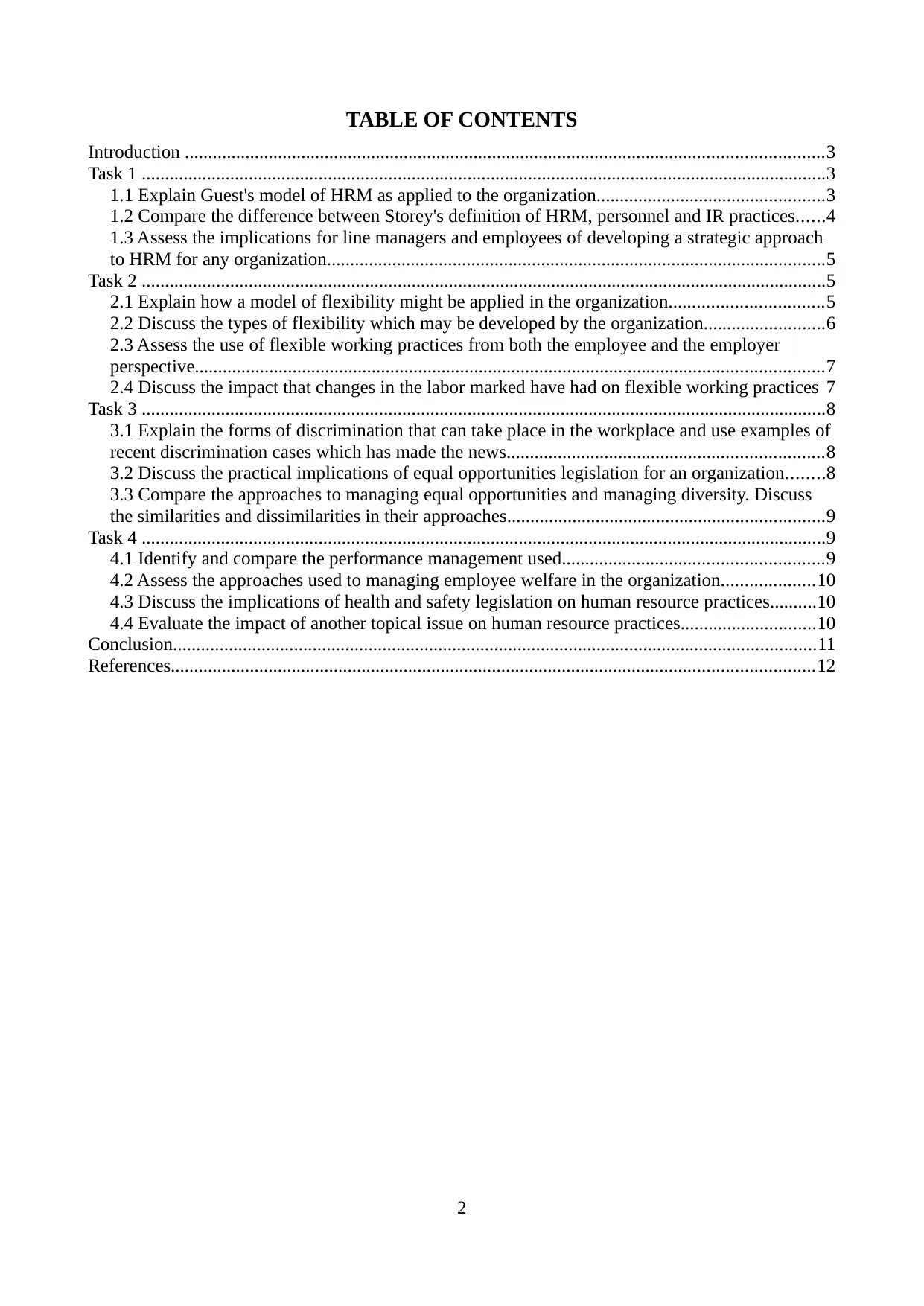
TABLE OF CONTENTS
Introduction .........................................................................................................................................3
Task 1 ...................................................................................................................................................3
1.1 Explain Guest's model of HRM as applied to the organization.................................................3
1.2 Compare the difference between Storey's definition of HRM, personnel and IR practices......4
1.3 Assess the implications for line managers and employees of developing a strategic approach
to HRM for any organization...........................................................................................................5
Task 2 ...................................................................................................................................................5
2.1 Explain how a model of flexibility might be applied in the organization.................................5
2.2 Discuss the types of flexibility which may be developed by the organization..........................6
2.3 Assess the use of flexible working practices from both the employee and the employer
perspective.......................................................................................................................................7
2.4 Discuss the impact that changes in the labor marked have had on flexible working practices 7
Task 3 ...................................................................................................................................................8
3.1 Explain the forms of discrimination that can take place in the workplace and use examples of
recent discrimination cases which has made the news....................................................................8
3.2 Discuss the practical implications of equal opportunities legislation for an organization........8
3.3 Compare the approaches to managing equal opportunities and managing diversity. Discuss
the similarities and dissimilarities in their approaches....................................................................9
Task 4 ...................................................................................................................................................9
4.1 Identify and compare the performance management used........................................................9
4.2 Assess the approaches used to managing employee welfare in the organization....................10
4.3 Discuss the implications of health and safety legislation on human resource practices..........10
4.4 Evaluate the impact of another topical issue on human resource practices.............................10
Conclusion..........................................................................................................................................11
References..........................................................................................................................................12
2
Introduction .........................................................................................................................................3
Task 1 ...................................................................................................................................................3
1.1 Explain Guest's model of HRM as applied to the organization.................................................3
1.2 Compare the difference between Storey's definition of HRM, personnel and IR practices......4
1.3 Assess the implications for line managers and employees of developing a strategic approach
to HRM for any organization...........................................................................................................5
Task 2 ...................................................................................................................................................5
2.1 Explain how a model of flexibility might be applied in the organization.................................5
2.2 Discuss the types of flexibility which may be developed by the organization..........................6
2.3 Assess the use of flexible working practices from both the employee and the employer
perspective.......................................................................................................................................7
2.4 Discuss the impact that changes in the labor marked have had on flexible working practices 7
Task 3 ...................................................................................................................................................8
3.1 Explain the forms of discrimination that can take place in the workplace and use examples of
recent discrimination cases which has made the news....................................................................8
3.2 Discuss the practical implications of equal opportunities legislation for an organization........8
3.3 Compare the approaches to managing equal opportunities and managing diversity. Discuss
the similarities and dissimilarities in their approaches....................................................................9
Task 4 ...................................................................................................................................................9
4.1 Identify and compare the performance management used........................................................9
4.2 Assess the approaches used to managing employee welfare in the organization....................10
4.3 Discuss the implications of health and safety legislation on human resource practices..........10
4.4 Evaluate the impact of another topical issue on human resource practices.............................10
Conclusion..........................................................................................................................................11
References..........................................................................................................................................12
2
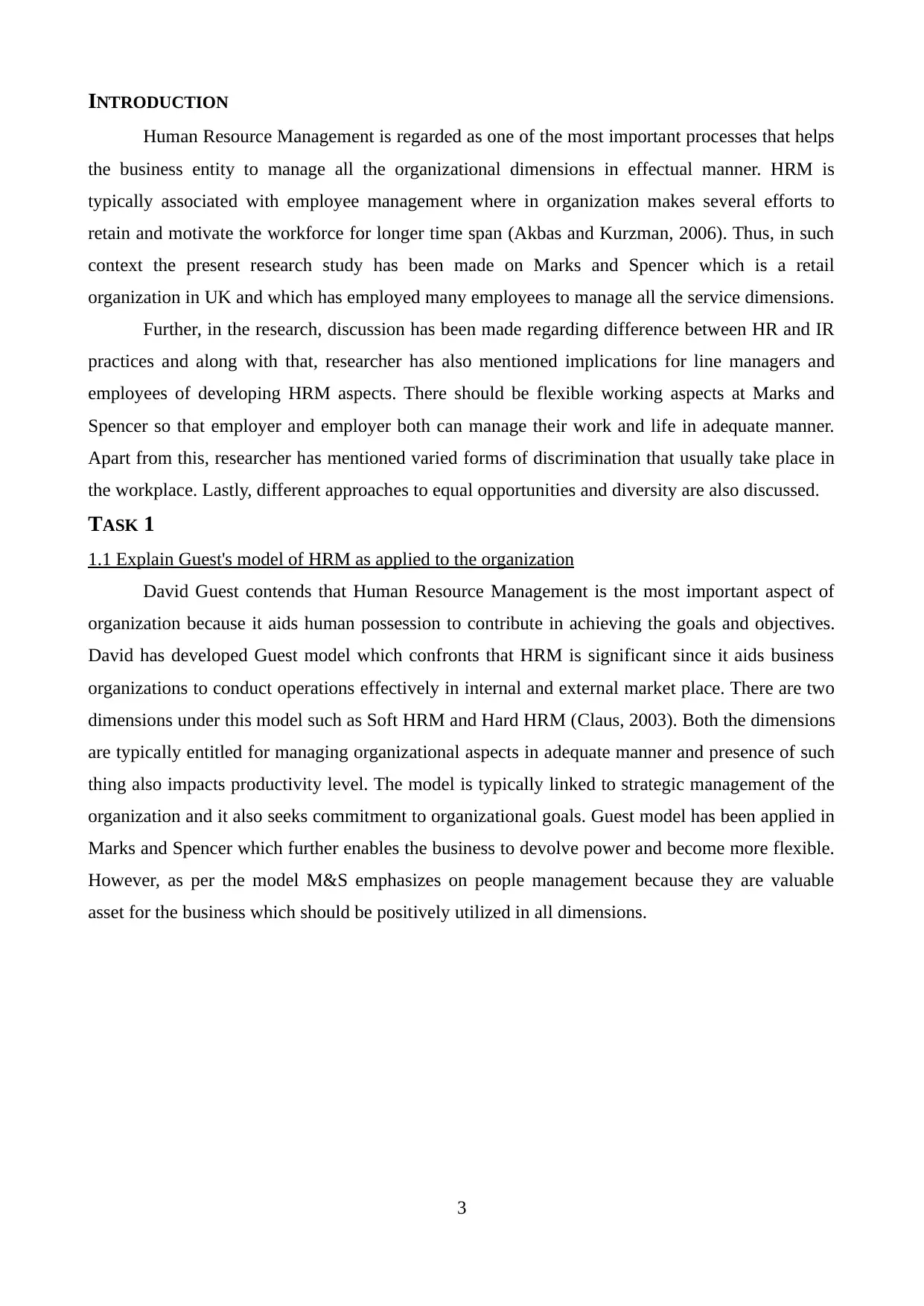
INTRODUCTION
Human Resource Management is regarded as one of the most important processes that helps
the business entity to manage all the organizational dimensions in effectual manner. HRM is
typically associated with employee management where in organization makes several efforts to
retain and motivate the workforce for longer time span (Akbas and Kurzman, 2006). Thus, in such
context the present research study has been made on Marks and Spencer which is a retail
organization in UK and which has employed many employees to manage all the service dimensions.
Further, in the research, discussion has been made regarding difference between HR and IR
practices and along with that, researcher has also mentioned implications for line managers and
employees of developing HRM aspects. There should be flexible working aspects at Marks and
Spencer so that employer and employer both can manage their work and life in adequate manner.
Apart from this, researcher has mentioned varied forms of discrimination that usually take place in
the workplace. Lastly, different approaches to equal opportunities and diversity are also discussed.
TASK 1
1.1 Explain Guest's model of HRM as applied to the organization
David Guest contends that Human Resource Management is the most important aspect of
organization because it aids human possession to contribute in achieving the goals and objectives.
David has developed Guest model which confronts that HRM is significant since it aids business
organizations to conduct operations effectively in internal and external market place. There are two
dimensions under this model such as Soft HRM and Hard HRM (Claus, 2003). Both the dimensions
are typically entitled for managing organizational aspects in adequate manner and presence of such
thing also impacts productivity level. The model is typically linked to strategic management of the
organization and it also seeks commitment to organizational goals. Guest model has been applied in
Marks and Spencer which further enables the business to devolve power and become more flexible.
However, as per the model M&S emphasizes on people management because they are valuable
asset for the business which should be positively utilized in all dimensions.
3
Human Resource Management is regarded as one of the most important processes that helps
the business entity to manage all the organizational dimensions in effectual manner. HRM is
typically associated with employee management where in organization makes several efforts to
retain and motivate the workforce for longer time span (Akbas and Kurzman, 2006). Thus, in such
context the present research study has been made on Marks and Spencer which is a retail
organization in UK and which has employed many employees to manage all the service dimensions.
Further, in the research, discussion has been made regarding difference between HR and IR
practices and along with that, researcher has also mentioned implications for line managers and
employees of developing HRM aspects. There should be flexible working aspects at Marks and
Spencer so that employer and employer both can manage their work and life in adequate manner.
Apart from this, researcher has mentioned varied forms of discrimination that usually take place in
the workplace. Lastly, different approaches to equal opportunities and diversity are also discussed.
TASK 1
1.1 Explain Guest's model of HRM as applied to the organization
David Guest contends that Human Resource Management is the most important aspect of
organization because it aids human possession to contribute in achieving the goals and objectives.
David has developed Guest model which confronts that HRM is significant since it aids business
organizations to conduct operations effectively in internal and external market place. There are two
dimensions under this model such as Soft HRM and Hard HRM (Claus, 2003). Both the dimensions
are typically entitled for managing organizational aspects in adequate manner and presence of such
thing also impacts productivity level. The model is typically linked to strategic management of the
organization and it also seeks commitment to organizational goals. Guest model has been applied in
Marks and Spencer which further enables the business to devolve power and become more flexible.
However, as per the model M&S emphasizes on people management because they are valuable
asset for the business which should be positively utilized in all dimensions.
3
⊘ This is a preview!⊘
Do you want full access?
Subscribe today to unlock all pages.

Trusted by 1+ million students worldwide
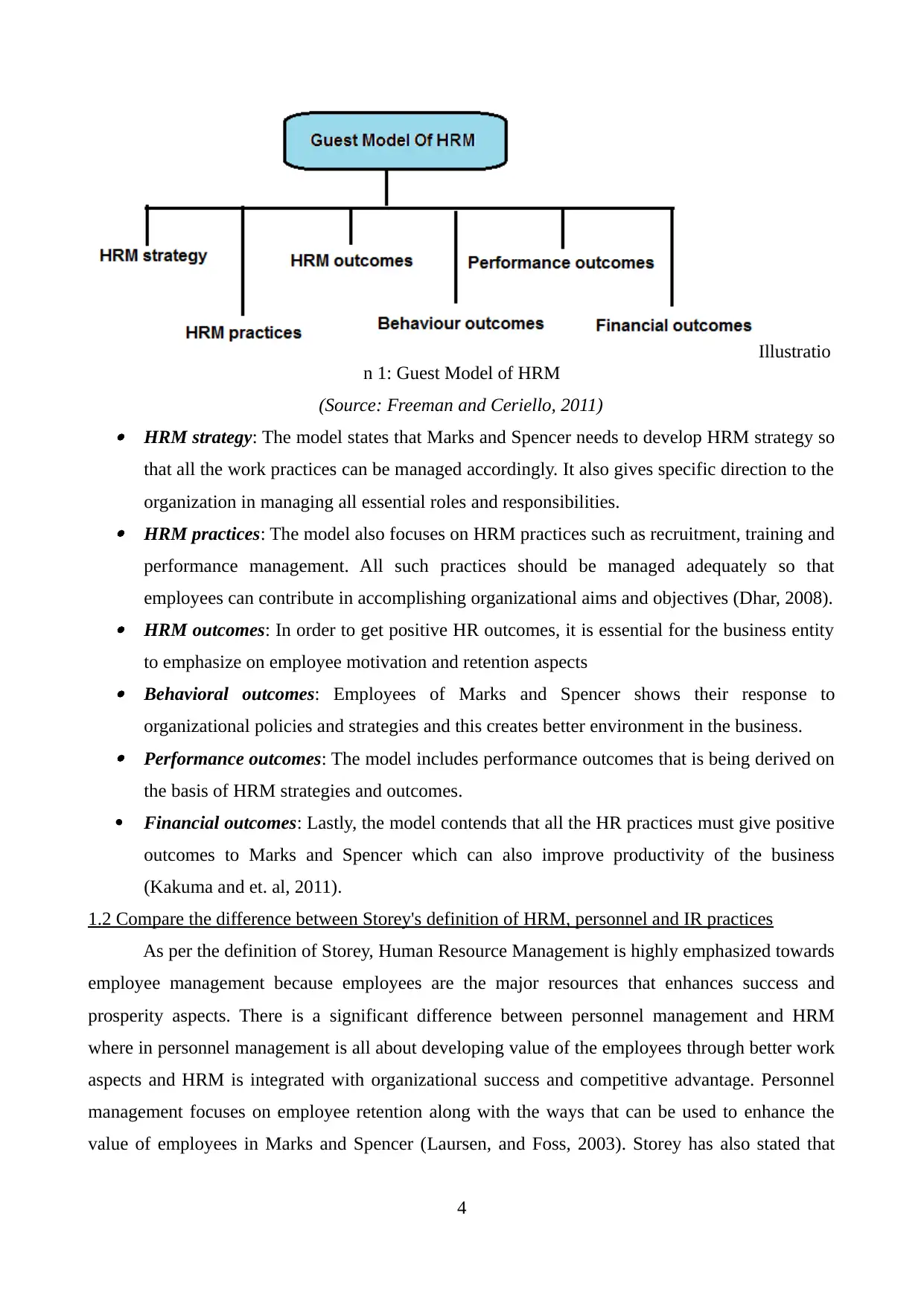
(Source: Freeman and Ceriello, 2011) HRM strategy: The model states that Marks and Spencer needs to develop HRM strategy so
that all the work practices can be managed accordingly. It also gives specific direction to the
organization in managing all essential roles and responsibilities. HRM practices: The model also focuses on HRM practices such as recruitment, training and
performance management. All such practices should be managed adequately so that
employees can contribute in accomplishing organizational aims and objectives (Dhar, 2008). HRM outcomes: In order to get positive HR outcomes, it is essential for the business entity
to emphasize on employee motivation and retention aspects Behavioral outcomes: Employees of Marks and Spencer shows their response to
organizational policies and strategies and this creates better environment in the business. Performance outcomes: The model includes performance outcomes that is being derived on
the basis of HRM strategies and outcomes.
Financial outcomes: Lastly, the model contends that all the HR practices must give positive
outcomes to Marks and Spencer which can also improve productivity of the business
(Kakuma and et. al, 2011).
1.2 Compare the difference between Storey's definition of HRM, personnel and IR practices
As per the definition of Storey, Human Resource Management is highly emphasized towards
employee management because employees are the major resources that enhances success and
prosperity aspects. There is a significant difference between personnel management and HRM
where in personnel management is all about developing value of the employees through better work
aspects and HRM is integrated with organizational success and competitive advantage. Personnel
management focuses on employee retention along with the ways that can be used to enhance the
value of employees in Marks and Spencer (Laursen, and Foss, 2003). Storey has also stated that
4
Illustratio
n 1: Guest Model of HRM
that all the work practices can be managed accordingly. It also gives specific direction to the
organization in managing all essential roles and responsibilities. HRM practices: The model also focuses on HRM practices such as recruitment, training and
performance management. All such practices should be managed adequately so that
employees can contribute in accomplishing organizational aims and objectives (Dhar, 2008). HRM outcomes: In order to get positive HR outcomes, it is essential for the business entity
to emphasize on employee motivation and retention aspects Behavioral outcomes: Employees of Marks and Spencer shows their response to
organizational policies and strategies and this creates better environment in the business. Performance outcomes: The model includes performance outcomes that is being derived on
the basis of HRM strategies and outcomes.
Financial outcomes: Lastly, the model contends that all the HR practices must give positive
outcomes to Marks and Spencer which can also improve productivity of the business
(Kakuma and et. al, 2011).
1.2 Compare the difference between Storey's definition of HRM, personnel and IR practices
As per the definition of Storey, Human Resource Management is highly emphasized towards
employee management because employees are the major resources that enhances success and
prosperity aspects. There is a significant difference between personnel management and HRM
where in personnel management is all about developing value of the employees through better work
aspects and HRM is integrated with organizational success and competitive advantage. Personnel
management focuses on employee retention along with the ways that can be used to enhance the
value of employees in Marks and Spencer (Laursen, and Foss, 2003). Storey has also stated that
4
Illustratio
n 1: Guest Model of HRM
Paraphrase This Document
Need a fresh take? Get an instant paraphrase of this document with our AI Paraphraser
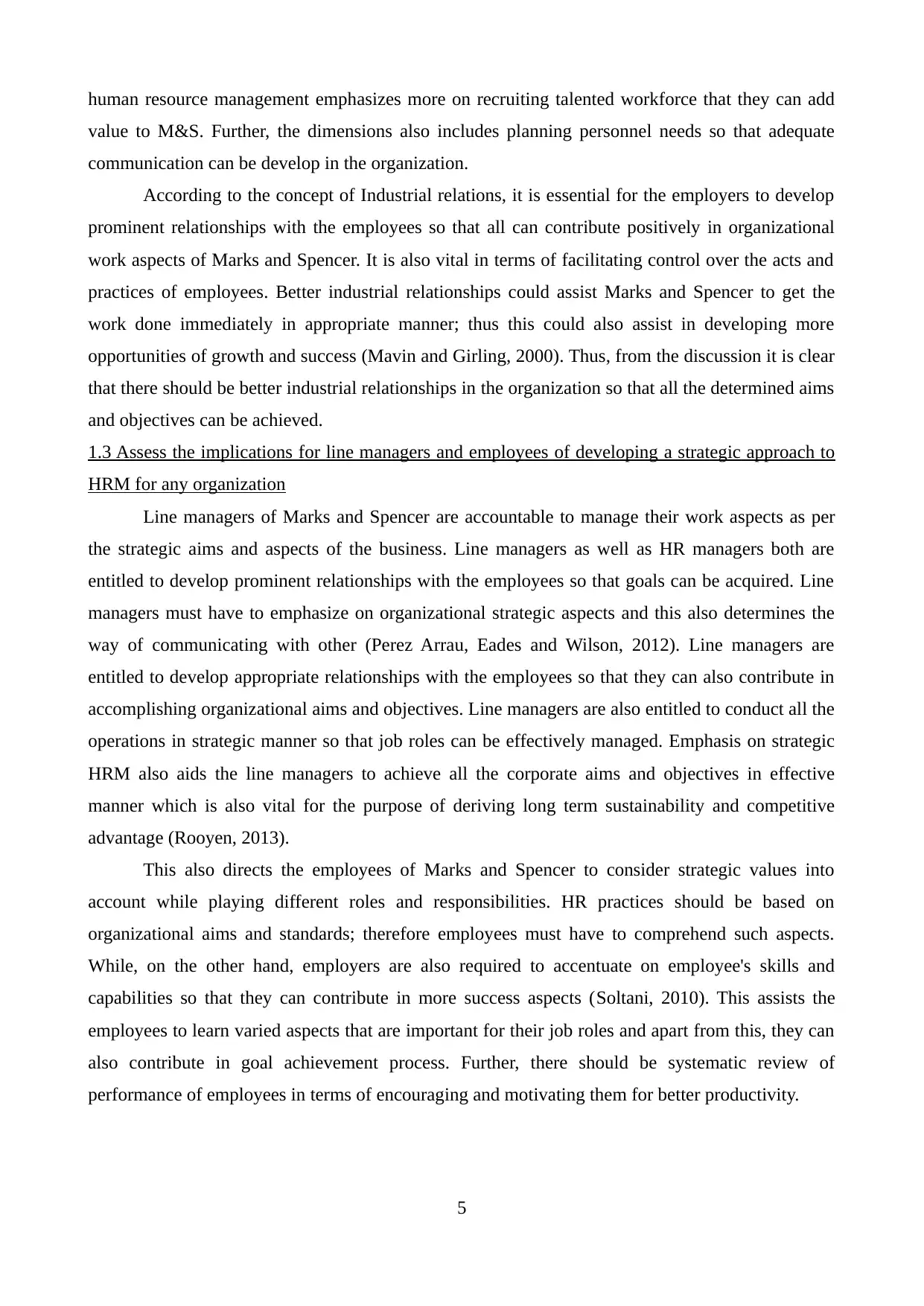
human resource management emphasizes more on recruiting talented workforce that they can add
value to M&S. Further, the dimensions also includes planning personnel needs so that adequate
communication can be develop in the organization.
According to the concept of Industrial relations, it is essential for the employers to develop
prominent relationships with the employees so that all can contribute positively in organizational
work aspects of Marks and Spencer. It is also vital in terms of facilitating control over the acts and
practices of employees. Better industrial relationships could assist Marks and Spencer to get the
work done immediately in appropriate manner; thus this could also assist in developing more
opportunities of growth and success (Mavin and Girling, 2000). Thus, from the discussion it is clear
that there should be better industrial relationships in the organization so that all the determined aims
and objectives can be achieved.
1.3 Assess the implications for line managers and employees of developing a strategic approach to
HRM for any organization
Line managers of Marks and Spencer are accountable to manage their work aspects as per
the strategic aims and aspects of the business. Line managers as well as HR managers both are
entitled to develop prominent relationships with the employees so that goals can be acquired. Line
managers must have to emphasize on organizational strategic aspects and this also determines the
way of communicating with other (Perez Arrau, Eades and Wilson, 2012). Line managers are
entitled to develop appropriate relationships with the employees so that they can also contribute in
accomplishing organizational aims and objectives. Line managers are also entitled to conduct all the
operations in strategic manner so that job roles can be effectively managed. Emphasis on strategic
HRM also aids the line managers to achieve all the corporate aims and objectives in effective
manner which is also vital for the purpose of deriving long term sustainability and competitive
advantage (Rooyen, 2013).
This also directs the employees of Marks and Spencer to consider strategic values into
account while playing different roles and responsibilities. HR practices should be based on
organizational aims and standards; therefore employees must have to comprehend such aspects.
While, on the other hand, employers are also required to accentuate on employee's skills and
capabilities so that they can contribute in more success aspects (Soltani, 2010). This assists the
employees to learn varied aspects that are important for their job roles and apart from this, they can
also contribute in goal achievement process. Further, there should be systematic review of
performance of employees in terms of encouraging and motivating them for better productivity.
5
value to M&S. Further, the dimensions also includes planning personnel needs so that adequate
communication can be develop in the organization.
According to the concept of Industrial relations, it is essential for the employers to develop
prominent relationships with the employees so that all can contribute positively in organizational
work aspects of Marks and Spencer. It is also vital in terms of facilitating control over the acts and
practices of employees. Better industrial relationships could assist Marks and Spencer to get the
work done immediately in appropriate manner; thus this could also assist in developing more
opportunities of growth and success (Mavin and Girling, 2000). Thus, from the discussion it is clear
that there should be better industrial relationships in the organization so that all the determined aims
and objectives can be achieved.
1.3 Assess the implications for line managers and employees of developing a strategic approach to
HRM for any organization
Line managers of Marks and Spencer are accountable to manage their work aspects as per
the strategic aims and aspects of the business. Line managers as well as HR managers both are
entitled to develop prominent relationships with the employees so that goals can be acquired. Line
managers must have to emphasize on organizational strategic aspects and this also determines the
way of communicating with other (Perez Arrau, Eades and Wilson, 2012). Line managers are
entitled to develop appropriate relationships with the employees so that they can also contribute in
accomplishing organizational aims and objectives. Line managers are also entitled to conduct all the
operations in strategic manner so that job roles can be effectively managed. Emphasis on strategic
HRM also aids the line managers to achieve all the corporate aims and objectives in effective
manner which is also vital for the purpose of deriving long term sustainability and competitive
advantage (Rooyen, 2013).
This also directs the employees of Marks and Spencer to consider strategic values into
account while playing different roles and responsibilities. HR practices should be based on
organizational aims and standards; therefore employees must have to comprehend such aspects.
While, on the other hand, employers are also required to accentuate on employee's skills and
capabilities so that they can contribute in more success aspects (Soltani, 2010). This assists the
employees to learn varied aspects that are important for their job roles and apart from this, they can
also contribute in goal achievement process. Further, there should be systematic review of
performance of employees in terms of encouraging and motivating them for better productivity.
5
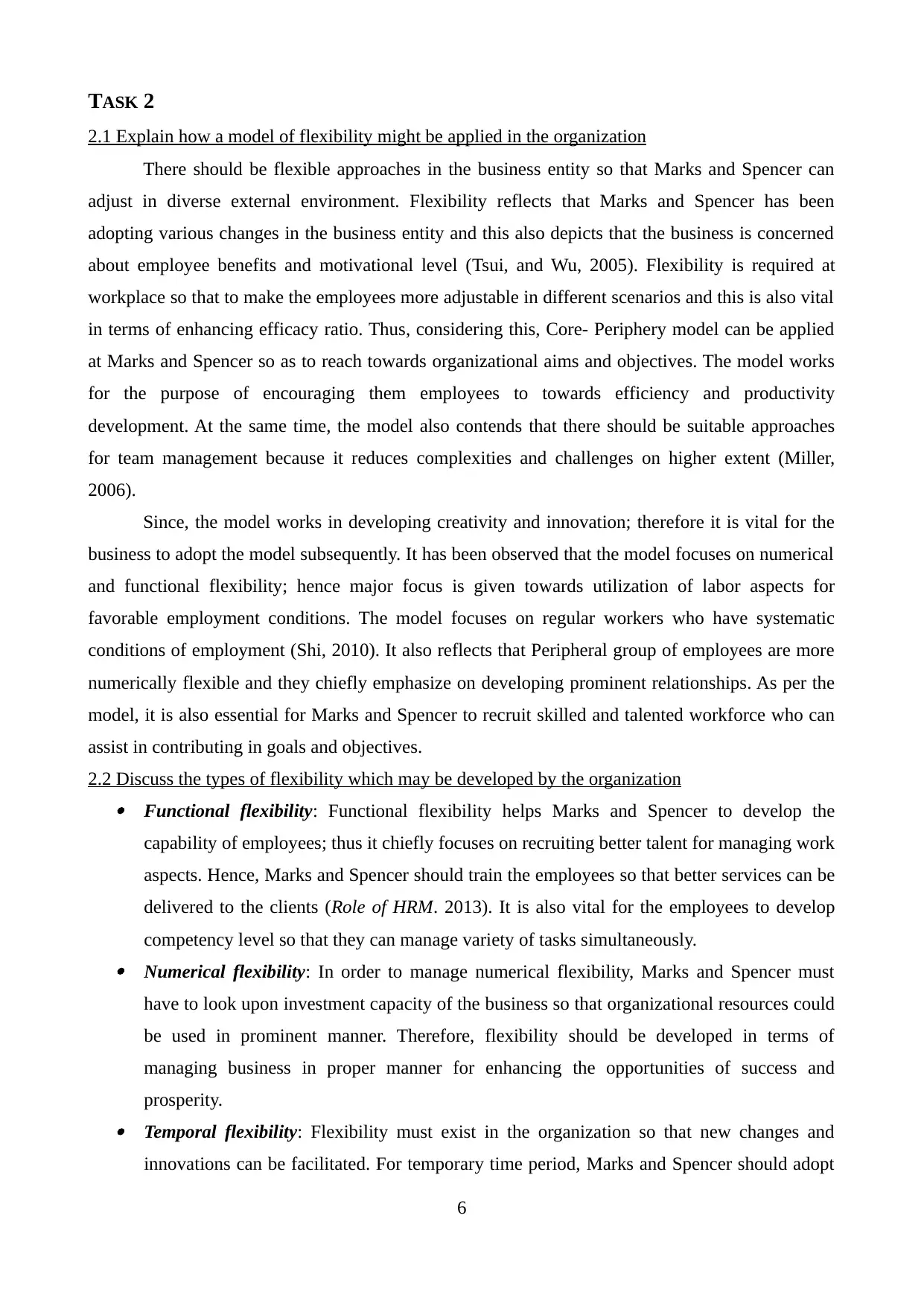
TASK 2
2.1 Explain how a model of flexibility might be applied in the organization
There should be flexible approaches in the business entity so that Marks and Spencer can
adjust in diverse external environment. Flexibility reflects that Marks and Spencer has been
adopting various changes in the business entity and this also depicts that the business is concerned
about employee benefits and motivational level (Tsui, and Wu, 2005). Flexibility is required at
workplace so that to make the employees more adjustable in different scenarios and this is also vital
in terms of enhancing efficacy ratio. Thus, considering this, Core- Periphery model can be applied
at Marks and Spencer so as to reach towards organizational aims and objectives. The model works
for the purpose of encouraging them employees to towards efficiency and productivity
development. At the same time, the model also contends that there should be suitable approaches
for team management because it reduces complexities and challenges on higher extent (Miller,
2006).
Since, the model works in developing creativity and innovation; therefore it is vital for the
business to adopt the model subsequently. It has been observed that the model focuses on numerical
and functional flexibility; hence major focus is given towards utilization of labor aspects for
favorable employment conditions. The model focuses on regular workers who have systematic
conditions of employment (Shi, 2010). It also reflects that Peripheral group of employees are more
numerically flexible and they chiefly emphasize on developing prominent relationships. As per the
model, it is also essential for Marks and Spencer to recruit skilled and talented workforce who can
assist in contributing in goals and objectives.
2.2 Discuss the types of flexibility which may be developed by the organization Functional flexibility: Functional flexibility helps Marks and Spencer to develop the
capability of employees; thus it chiefly focuses on recruiting better talent for managing work
aspects. Hence, Marks and Spencer should train the employees so that better services can be
delivered to the clients (Role of HRM. 2013). It is also vital for the employees to develop
competency level so that they can manage variety of tasks simultaneously. Numerical flexibility: In order to manage numerical flexibility, Marks and Spencer must
have to look upon investment capacity of the business so that organizational resources could
be used in prominent manner. Therefore, flexibility should be developed in terms of
managing business in proper manner for enhancing the opportunities of success and
prosperity. Temporal flexibility: Flexibility must exist in the organization so that new changes and
innovations can be facilitated. For temporary time period, Marks and Spencer should adopt
6
2.1 Explain how a model of flexibility might be applied in the organization
There should be flexible approaches in the business entity so that Marks and Spencer can
adjust in diverse external environment. Flexibility reflects that Marks and Spencer has been
adopting various changes in the business entity and this also depicts that the business is concerned
about employee benefits and motivational level (Tsui, and Wu, 2005). Flexibility is required at
workplace so that to make the employees more adjustable in different scenarios and this is also vital
in terms of enhancing efficacy ratio. Thus, considering this, Core- Periphery model can be applied
at Marks and Spencer so as to reach towards organizational aims and objectives. The model works
for the purpose of encouraging them employees to towards efficiency and productivity
development. At the same time, the model also contends that there should be suitable approaches
for team management because it reduces complexities and challenges on higher extent (Miller,
2006).
Since, the model works in developing creativity and innovation; therefore it is vital for the
business to adopt the model subsequently. It has been observed that the model focuses on numerical
and functional flexibility; hence major focus is given towards utilization of labor aspects for
favorable employment conditions. The model focuses on regular workers who have systematic
conditions of employment (Shi, 2010). It also reflects that Peripheral group of employees are more
numerically flexible and they chiefly emphasize on developing prominent relationships. As per the
model, it is also essential for Marks and Spencer to recruit skilled and talented workforce who can
assist in contributing in goals and objectives.
2.2 Discuss the types of flexibility which may be developed by the organization Functional flexibility: Functional flexibility helps Marks and Spencer to develop the
capability of employees; thus it chiefly focuses on recruiting better talent for managing work
aspects. Hence, Marks and Spencer should train the employees so that better services can be
delivered to the clients (Role of HRM. 2013). It is also vital for the employees to develop
competency level so that they can manage variety of tasks simultaneously. Numerical flexibility: In order to manage numerical flexibility, Marks and Spencer must
have to look upon investment capacity of the business so that organizational resources could
be used in prominent manner. Therefore, flexibility should be developed in terms of
managing business in proper manner for enhancing the opportunities of success and
prosperity. Temporal flexibility: Flexibility must exist in the organization so that new changes and
innovations can be facilitated. For temporary time period, Marks and Spencer should adopt
6
⊘ This is a preview!⊘
Do you want full access?
Subscribe today to unlock all pages.

Trusted by 1+ million students worldwide
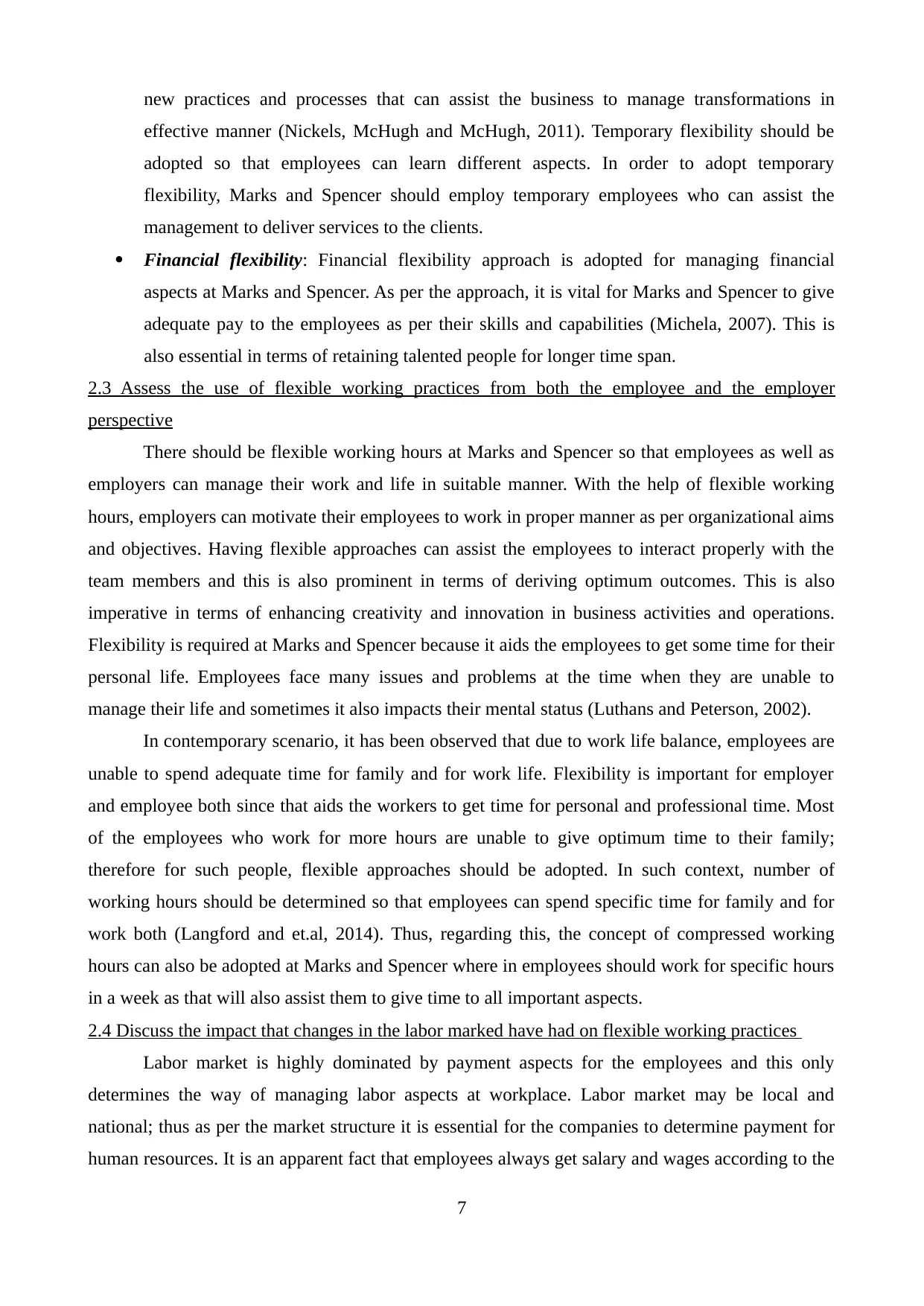
new practices and processes that can assist the business to manage transformations in
effective manner (Nickels, McHugh and McHugh, 2011). Temporary flexibility should be
adopted so that employees can learn different aspects. In order to adopt temporary
flexibility, Marks and Spencer should employ temporary employees who can assist the
management to deliver services to the clients.
Financial flexibility: Financial flexibility approach is adopted for managing financial
aspects at Marks and Spencer. As per the approach, it is vital for Marks and Spencer to give
adequate pay to the employees as per their skills and capabilities (Michela, 2007). This is
also essential in terms of retaining talented people for longer time span.
2.3 Assess the use of flexible working practices from both the employee and the employer
perspective
There should be flexible working hours at Marks and Spencer so that employees as well as
employers can manage their work and life in suitable manner. With the help of flexible working
hours, employers can motivate their employees to work in proper manner as per organizational aims
and objectives. Having flexible approaches can assist the employees to interact properly with the
team members and this is also prominent in terms of deriving optimum outcomes. This is also
imperative in terms of enhancing creativity and innovation in business activities and operations.
Flexibility is required at Marks and Spencer because it aids the employees to get some time for their
personal life. Employees face many issues and problems at the time when they are unable to
manage their life and sometimes it also impacts their mental status (Luthans and Peterson, 2002).
In contemporary scenario, it has been observed that due to work life balance, employees are
unable to spend adequate time for family and for work life. Flexibility is important for employer
and employee both since that aids the workers to get time for personal and professional time. Most
of the employees who work for more hours are unable to give optimum time to their family;
therefore for such people, flexible approaches should be adopted. In such context, number of
working hours should be determined so that employees can spend specific time for family and for
work both (Langford and et.al, 2014). Thus, regarding this, the concept of compressed working
hours can also be adopted at Marks and Spencer where in employees should work for specific hours
in a week as that will also assist them to give time to all important aspects.
2.4 Discuss the impact that changes in the labor marked have had on flexible working practices
Labor market is highly dominated by payment aspects for the employees and this only
determines the way of managing labor aspects at workplace. Labor market may be local and
national; thus as per the market structure it is essential for the companies to determine payment for
human resources. It is an apparent fact that employees always get salary and wages according to the
7
effective manner (Nickels, McHugh and McHugh, 2011). Temporary flexibility should be
adopted so that employees can learn different aspects. In order to adopt temporary
flexibility, Marks and Spencer should employ temporary employees who can assist the
management to deliver services to the clients.
Financial flexibility: Financial flexibility approach is adopted for managing financial
aspects at Marks and Spencer. As per the approach, it is vital for Marks and Spencer to give
adequate pay to the employees as per their skills and capabilities (Michela, 2007). This is
also essential in terms of retaining talented people for longer time span.
2.3 Assess the use of flexible working practices from both the employee and the employer
perspective
There should be flexible working hours at Marks and Spencer so that employees as well as
employers can manage their work and life in suitable manner. With the help of flexible working
hours, employers can motivate their employees to work in proper manner as per organizational aims
and objectives. Having flexible approaches can assist the employees to interact properly with the
team members and this is also prominent in terms of deriving optimum outcomes. This is also
imperative in terms of enhancing creativity and innovation in business activities and operations.
Flexibility is required at Marks and Spencer because it aids the employees to get some time for their
personal life. Employees face many issues and problems at the time when they are unable to
manage their life and sometimes it also impacts their mental status (Luthans and Peterson, 2002).
In contemporary scenario, it has been observed that due to work life balance, employees are
unable to spend adequate time for family and for work life. Flexibility is important for employer
and employee both since that aids the workers to get time for personal and professional time. Most
of the employees who work for more hours are unable to give optimum time to their family;
therefore for such people, flexible approaches should be adopted. In such context, number of
working hours should be determined so that employees can spend specific time for family and for
work both (Langford and et.al, 2014). Thus, regarding this, the concept of compressed working
hours can also be adopted at Marks and Spencer where in employees should work for specific hours
in a week as that will also assist them to give time to all important aspects.
2.4 Discuss the impact that changes in the labor marked have had on flexible working practices
Labor market is highly dominated by payment aspects for the employees and this only
determines the way of managing labor aspects at workplace. Labor market may be local and
national; thus as per the market structure it is essential for the companies to determine payment for
human resources. It is an apparent fact that employees always get salary and wages according to the
7
Paraphrase This Document
Need a fresh take? Get an instant paraphrase of this document with our AI Paraphraser
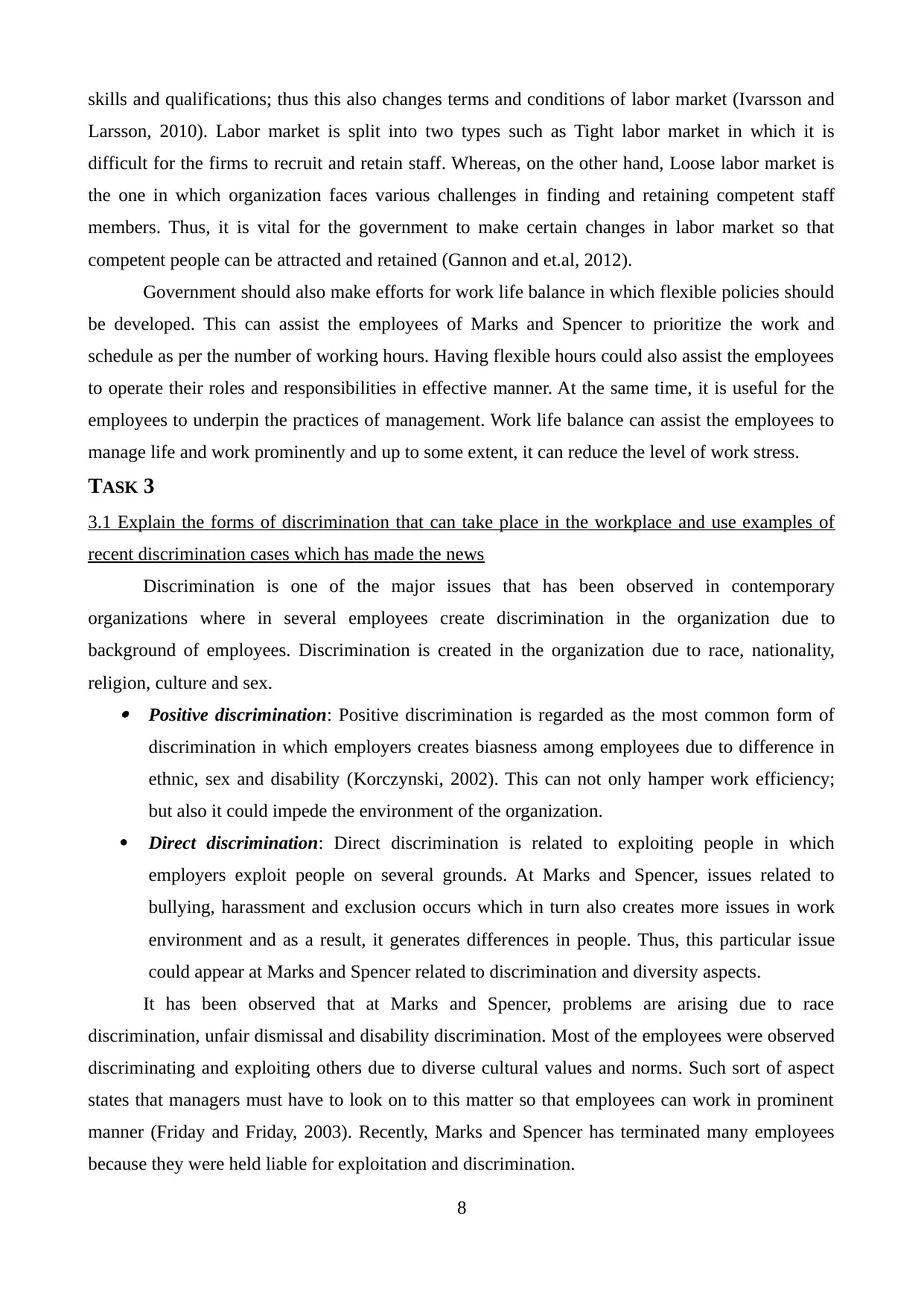
skills and qualifications; thus this also changes terms and conditions of labor market (Ivarsson and
Larsson, 2010). Labor market is split into two types such as Tight labor market in which it is
difficult for the firms to recruit and retain staff. Whereas, on the other hand, Loose labor market is
the one in which organization faces various challenges in finding and retaining competent staff
members. Thus, it is vital for the government to make certain changes in labor market so that
competent people can be attracted and retained (Gannon and et.al, 2012).
Government should also make efforts for work life balance in which flexible policies should
be developed. This can assist the employees of Marks and Spencer to prioritize the work and
schedule as per the number of working hours. Having flexible hours could also assist the employees
to operate their roles and responsibilities in effective manner. At the same time, it is useful for the
employees to underpin the practices of management. Work life balance can assist the employees to
manage life and work prominently and up to some extent, it can reduce the level of work stress.
TASK 3
3.1 Explain the forms of discrimination that can take place in the workplace and use examples of
recent discrimination cases which has made the news
Discrimination is one of the major issues that has been observed in contemporary
organizations where in several employees create discrimination in the organization due to
background of employees. Discrimination is created in the organization due to race, nationality,
religion, culture and sex. Positive discrimination: Positive discrimination is regarded as the most common form of
discrimination in which employers creates biasness among employees due to difference in
ethnic, sex and disability (Korczynski, 2002). This can not only hamper work efficiency;
but also it could impede the environment of the organization.
Direct discrimination: Direct discrimination is related to exploiting people in which
employers exploit people on several grounds. At Marks and Spencer, issues related to
bullying, harassment and exclusion occurs which in turn also creates more issues in work
environment and as a result, it generates differences in people. Thus, this particular issue
could appear at Marks and Spencer related to discrimination and diversity aspects.
It has been observed that at Marks and Spencer, problems are arising due to race
discrimination, unfair dismissal and disability discrimination. Most of the employees were observed
discriminating and exploiting others due to diverse cultural values and norms. Such sort of aspect
states that managers must have to look on to this matter so that employees can work in prominent
manner (Friday and Friday, 2003). Recently, Marks and Spencer has terminated many employees
because they were held liable for exploitation and discrimination.
8
Larsson, 2010). Labor market is split into two types such as Tight labor market in which it is
difficult for the firms to recruit and retain staff. Whereas, on the other hand, Loose labor market is
the one in which organization faces various challenges in finding and retaining competent staff
members. Thus, it is vital for the government to make certain changes in labor market so that
competent people can be attracted and retained (Gannon and et.al, 2012).
Government should also make efforts for work life balance in which flexible policies should
be developed. This can assist the employees of Marks and Spencer to prioritize the work and
schedule as per the number of working hours. Having flexible hours could also assist the employees
to operate their roles and responsibilities in effective manner. At the same time, it is useful for the
employees to underpin the practices of management. Work life balance can assist the employees to
manage life and work prominently and up to some extent, it can reduce the level of work stress.
TASK 3
3.1 Explain the forms of discrimination that can take place in the workplace and use examples of
recent discrimination cases which has made the news
Discrimination is one of the major issues that has been observed in contemporary
organizations where in several employees create discrimination in the organization due to
background of employees. Discrimination is created in the organization due to race, nationality,
religion, culture and sex. Positive discrimination: Positive discrimination is regarded as the most common form of
discrimination in which employers creates biasness among employees due to difference in
ethnic, sex and disability (Korczynski, 2002). This can not only hamper work efficiency;
but also it could impede the environment of the organization.
Direct discrimination: Direct discrimination is related to exploiting people in which
employers exploit people on several grounds. At Marks and Spencer, issues related to
bullying, harassment and exclusion occurs which in turn also creates more issues in work
environment and as a result, it generates differences in people. Thus, this particular issue
could appear at Marks and Spencer related to discrimination and diversity aspects.
It has been observed that at Marks and Spencer, problems are arising due to race
discrimination, unfair dismissal and disability discrimination. Most of the employees were observed
discriminating and exploiting others due to diverse cultural values and norms. Such sort of aspect
states that managers must have to look on to this matter so that employees can work in prominent
manner (Friday and Friday, 2003). Recently, Marks and Spencer has terminated many employees
because they were held liable for exploitation and discrimination.
8
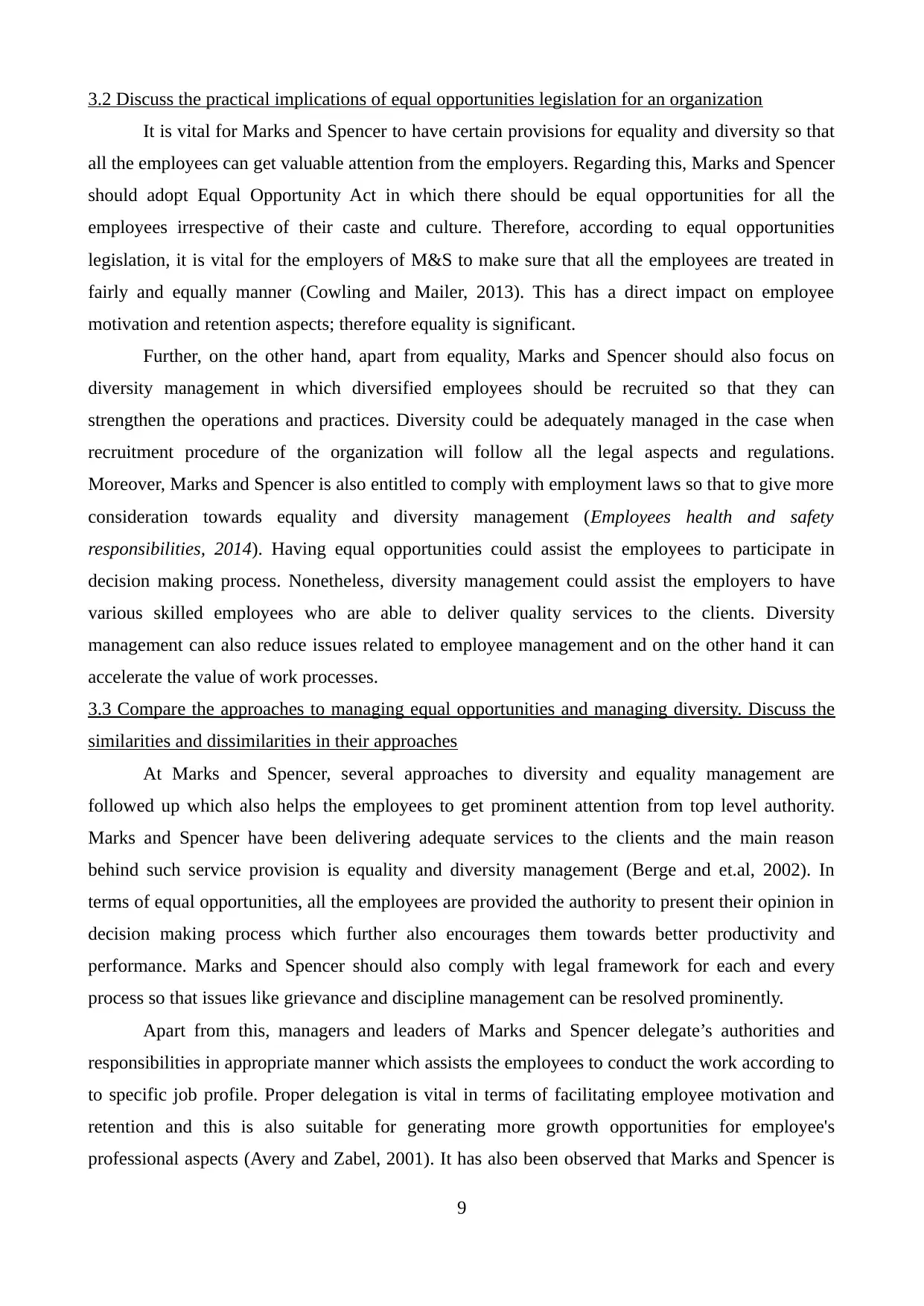
3.2 Discuss the practical implications of equal opportunities legislation for an organization
It is vital for Marks and Spencer to have certain provisions for equality and diversity so that
all the employees can get valuable attention from the employers. Regarding this, Marks and Spencer
should adopt Equal Opportunity Act in which there should be equal opportunities for all the
employees irrespective of their caste and culture. Therefore, according to equal opportunities
legislation, it is vital for the employers of M&S to make sure that all the employees are treated in
fairly and equally manner (Cowling and Mailer, 2013). This has a direct impact on employee
motivation and retention aspects; therefore equality is significant.
Further, on the other hand, apart from equality, Marks and Spencer should also focus on
diversity management in which diversified employees should be recruited so that they can
strengthen the operations and practices. Diversity could be adequately managed in the case when
recruitment procedure of the organization will follow all the legal aspects and regulations.
Moreover, Marks and Spencer is also entitled to comply with employment laws so that to give more
consideration towards equality and diversity management (Employees health and safety
responsibilities, 2014). Having equal opportunities could assist the employees to participate in
decision making process. Nonetheless, diversity management could assist the employers to have
various skilled employees who are able to deliver quality services to the clients. Diversity
management can also reduce issues related to employee management and on the other hand it can
accelerate the value of work processes.
3.3 Compare the approaches to managing equal opportunities and managing diversity. Discuss the
similarities and dissimilarities in their approaches
At Marks and Spencer, several approaches to diversity and equality management are
followed up which also helps the employees to get prominent attention from top level authority.
Marks and Spencer have been delivering adequate services to the clients and the main reason
behind such service provision is equality and diversity management (Berge and et.al, 2002). In
terms of equal opportunities, all the employees are provided the authority to present their opinion in
decision making process which further also encourages them towards better productivity and
performance. Marks and Spencer should also comply with legal framework for each and every
process so that issues like grievance and discipline management can be resolved prominently.
Apart from this, managers and leaders of Marks and Spencer delegate’s authorities and
responsibilities in appropriate manner which assists the employees to conduct the work according to
to specific job profile. Proper delegation is vital in terms of facilitating employee motivation and
retention and this is also suitable for generating more growth opportunities for employee's
professional aspects (Avery and Zabel, 2001). It has also been observed that Marks and Spencer is
9
It is vital for Marks and Spencer to have certain provisions for equality and diversity so that
all the employees can get valuable attention from the employers. Regarding this, Marks and Spencer
should adopt Equal Opportunity Act in which there should be equal opportunities for all the
employees irrespective of their caste and culture. Therefore, according to equal opportunities
legislation, it is vital for the employers of M&S to make sure that all the employees are treated in
fairly and equally manner (Cowling and Mailer, 2013). This has a direct impact on employee
motivation and retention aspects; therefore equality is significant.
Further, on the other hand, apart from equality, Marks and Spencer should also focus on
diversity management in which diversified employees should be recruited so that they can
strengthen the operations and practices. Diversity could be adequately managed in the case when
recruitment procedure of the organization will follow all the legal aspects and regulations.
Moreover, Marks and Spencer is also entitled to comply with employment laws so that to give more
consideration towards equality and diversity management (Employees health and safety
responsibilities, 2014). Having equal opportunities could assist the employees to participate in
decision making process. Nonetheless, diversity management could assist the employers to have
various skilled employees who are able to deliver quality services to the clients. Diversity
management can also reduce issues related to employee management and on the other hand it can
accelerate the value of work processes.
3.3 Compare the approaches to managing equal opportunities and managing diversity. Discuss the
similarities and dissimilarities in their approaches
At Marks and Spencer, several approaches to diversity and equality management are
followed up which also helps the employees to get prominent attention from top level authority.
Marks and Spencer have been delivering adequate services to the clients and the main reason
behind such service provision is equality and diversity management (Berge and et.al, 2002). In
terms of equal opportunities, all the employees are provided the authority to present their opinion in
decision making process which further also encourages them towards better productivity and
performance. Marks and Spencer should also comply with legal framework for each and every
process so that issues like grievance and discipline management can be resolved prominently.
Apart from this, managers and leaders of Marks and Spencer delegate’s authorities and
responsibilities in appropriate manner which assists the employees to conduct the work according to
to specific job profile. Proper delegation is vital in terms of facilitating employee motivation and
retention and this is also suitable for generating more growth opportunities for employee's
professional aspects (Avery and Zabel, 2001). It has also been observed that Marks and Spencer is
9
⊘ This is a preview!⊘
Do you want full access?
Subscribe today to unlock all pages.

Trusted by 1+ million students worldwide
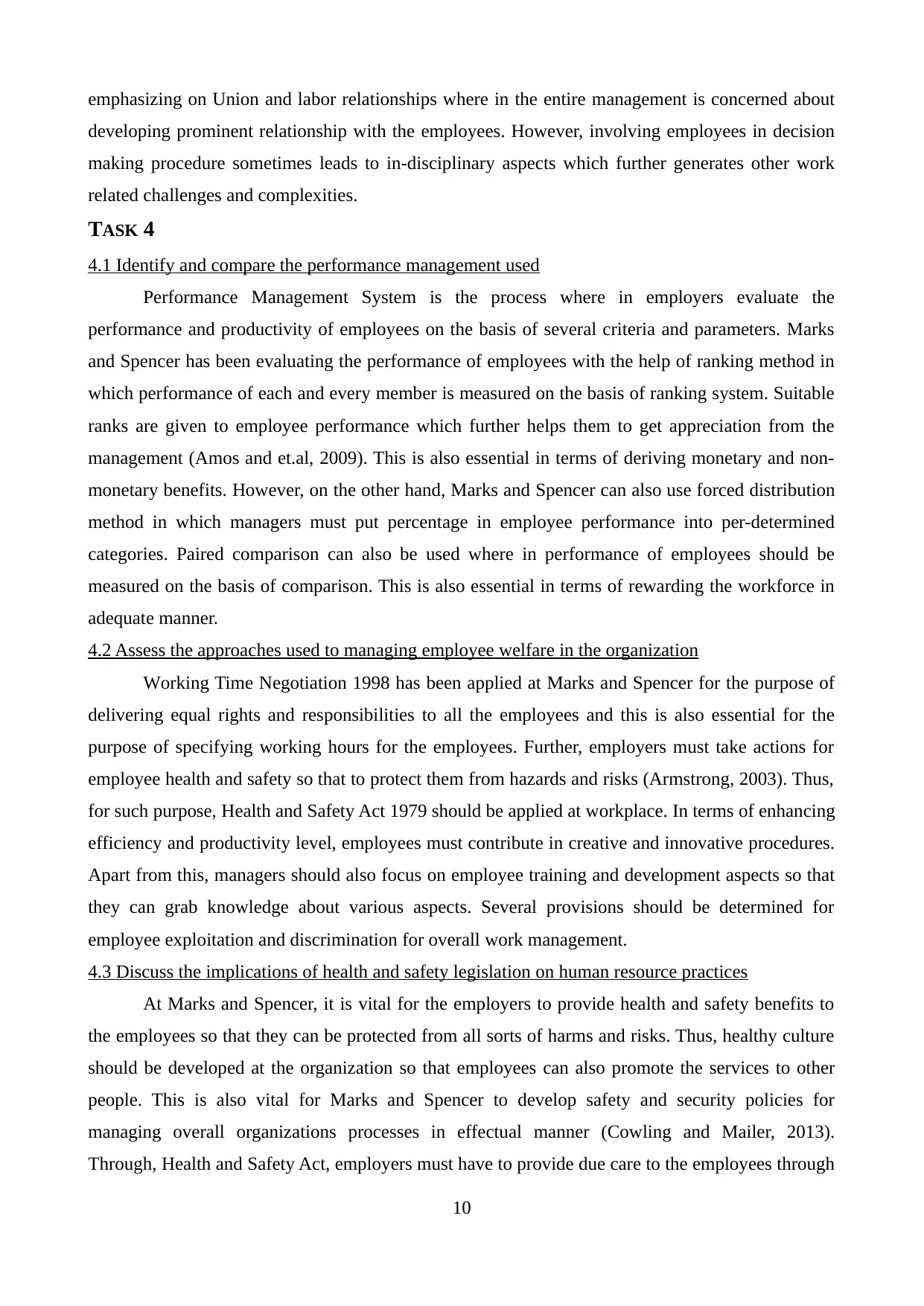
emphasizing on Union and labor relationships where in the entire management is concerned about
developing prominent relationship with the employees. However, involving employees in decision
making procedure sometimes leads to in-disciplinary aspects which further generates other work
related challenges and complexities.
TASK 4
4.1 Identify and compare the performance management used
Performance Management System is the process where in employers evaluate the
performance and productivity of employees on the basis of several criteria and parameters. Marks
and Spencer has been evaluating the performance of employees with the help of ranking method in
which performance of each and every member is measured on the basis of ranking system. Suitable
ranks are given to employee performance which further helps them to get appreciation from the
management (Amos and et.al, 2009). This is also essential in terms of deriving monetary and non-
monetary benefits. However, on the other hand, Marks and Spencer can also use forced distribution
method in which managers must put percentage in employee performance into per-determined
categories. Paired comparison can also be used where in performance of employees should be
measured on the basis of comparison. This is also essential in terms of rewarding the workforce in
adequate manner.
4.2 Assess the approaches used to managing employee welfare in the organization
Working Time Negotiation 1998 has been applied at Marks and Spencer for the purpose of
delivering equal rights and responsibilities to all the employees and this is also essential for the
purpose of specifying working hours for the employees. Further, employers must take actions for
employee health and safety so that to protect them from hazards and risks (Armstrong, 2003). Thus,
for such purpose, Health and Safety Act 1979 should be applied at workplace. In terms of enhancing
efficiency and productivity level, employees must contribute in creative and innovative procedures.
Apart from this, managers should also focus on employee training and development aspects so that
they can grab knowledge about various aspects. Several provisions should be determined for
employee exploitation and discrimination for overall work management.
4.3 Discuss the implications of health and safety legislation on human resource practices
At Marks and Spencer, it is vital for the employers to provide health and safety benefits to
the employees so that they can be protected from all sorts of harms and risks. Thus, healthy culture
should be developed at the organization so that employees can also promote the services to other
people. This is also vital for Marks and Spencer to develop safety and security policies for
managing overall organizations processes in effectual manner (Cowling and Mailer, 2013).
Through, Health and Safety Act, employers must have to provide due care to the employees through
10
developing prominent relationship with the employees. However, involving employees in decision
making procedure sometimes leads to in-disciplinary aspects which further generates other work
related challenges and complexities.
TASK 4
4.1 Identify and compare the performance management used
Performance Management System is the process where in employers evaluate the
performance and productivity of employees on the basis of several criteria and parameters. Marks
and Spencer has been evaluating the performance of employees with the help of ranking method in
which performance of each and every member is measured on the basis of ranking system. Suitable
ranks are given to employee performance which further helps them to get appreciation from the
management (Amos and et.al, 2009). This is also essential in terms of deriving monetary and non-
monetary benefits. However, on the other hand, Marks and Spencer can also use forced distribution
method in which managers must put percentage in employee performance into per-determined
categories. Paired comparison can also be used where in performance of employees should be
measured on the basis of comparison. This is also essential in terms of rewarding the workforce in
adequate manner.
4.2 Assess the approaches used to managing employee welfare in the organization
Working Time Negotiation 1998 has been applied at Marks and Spencer for the purpose of
delivering equal rights and responsibilities to all the employees and this is also essential for the
purpose of specifying working hours for the employees. Further, employers must take actions for
employee health and safety so that to protect them from hazards and risks (Armstrong, 2003). Thus,
for such purpose, Health and Safety Act 1979 should be applied at workplace. In terms of enhancing
efficiency and productivity level, employees must contribute in creative and innovative procedures.
Apart from this, managers should also focus on employee training and development aspects so that
they can grab knowledge about various aspects. Several provisions should be determined for
employee exploitation and discrimination for overall work management.
4.3 Discuss the implications of health and safety legislation on human resource practices
At Marks and Spencer, it is vital for the employers to provide health and safety benefits to
the employees so that they can be protected from all sorts of harms and risks. Thus, healthy culture
should be developed at the organization so that employees can also promote the services to other
people. This is also vital for Marks and Spencer to develop safety and security policies for
managing overall organizations processes in effectual manner (Cowling and Mailer, 2013).
Through, Health and Safety Act, employers must have to provide due care to the employees through
10
Paraphrase This Document
Need a fresh take? Get an instant paraphrase of this document with our AI Paraphraser
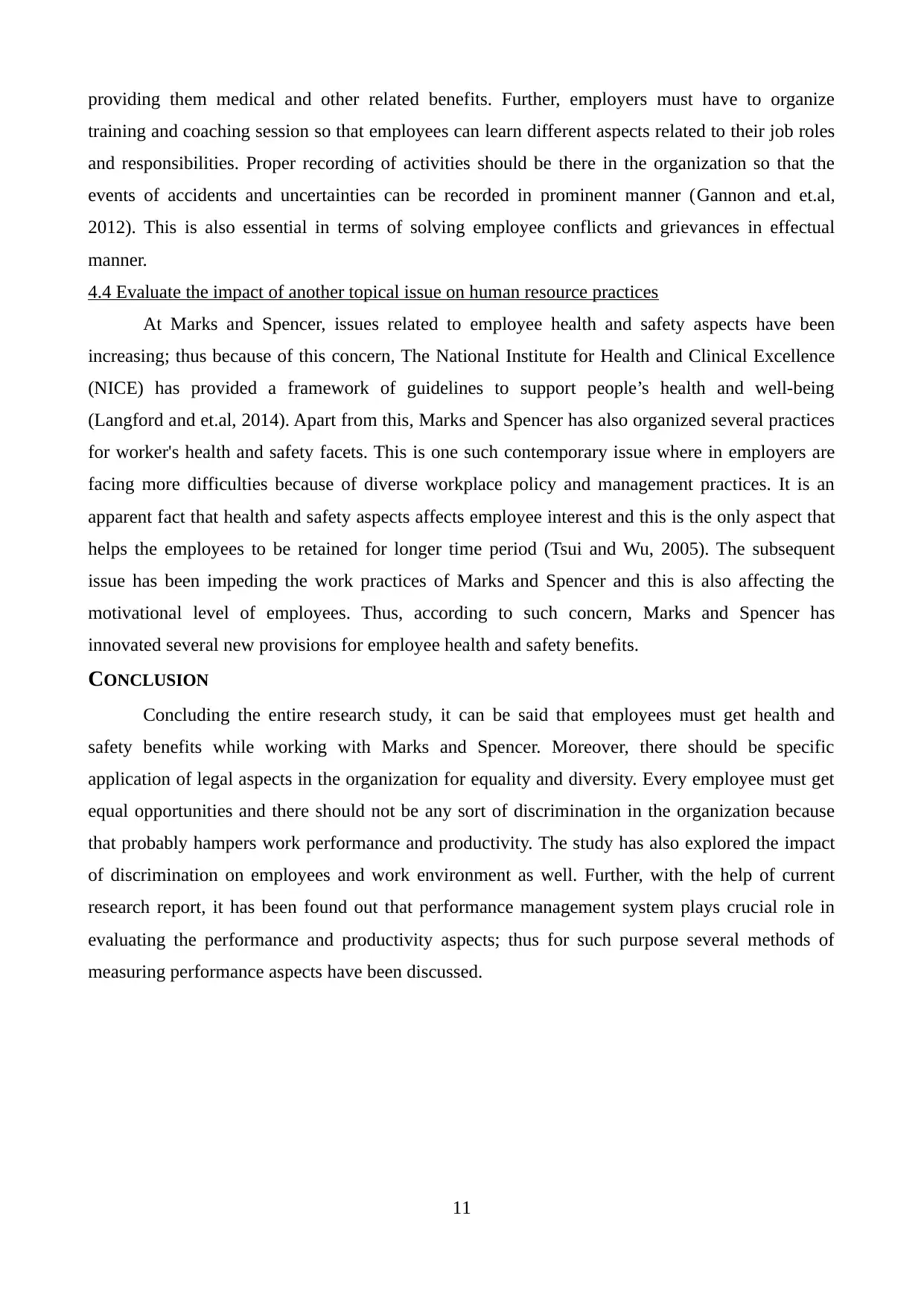
providing them medical and other related benefits. Further, employers must have to organize
training and coaching session so that employees can learn different aspects related to their job roles
and responsibilities. Proper recording of activities should be there in the organization so that the
events of accidents and uncertainties can be recorded in prominent manner (Gannon and et.al,
2012). This is also essential in terms of solving employee conflicts and grievances in effectual
manner.
4.4 Evaluate the impact of another topical issue on human resource practices
At Marks and Spencer, issues related to employee health and safety aspects have been
increasing; thus because of this concern, The National Institute for Health and Clinical Excellence
(NICE) has provided a framework of guidelines to support people’s health and well-being
(Langford and et.al, 2014). Apart from this, Marks and Spencer has also organized several practices
for worker's health and safety facets. This is one such contemporary issue where in employers are
facing more difficulties because of diverse workplace policy and management practices. It is an
apparent fact that health and safety aspects affects employee interest and this is the only aspect that
helps the employees to be retained for longer time period (Tsui and Wu, 2005). The subsequent
issue has been impeding the work practices of Marks and Spencer and this is also affecting the
motivational level of employees. Thus, according to such concern, Marks and Spencer has
innovated several new provisions for employee health and safety benefits.
CONCLUSION
Concluding the entire research study, it can be said that employees must get health and
safety benefits while working with Marks and Spencer. Moreover, there should be specific
application of legal aspects in the organization for equality and diversity. Every employee must get
equal opportunities and there should not be any sort of discrimination in the organization because
that probably hampers work performance and productivity. The study has also explored the impact
of discrimination on employees and work environment as well. Further, with the help of current
research report, it has been found out that performance management system plays crucial role in
evaluating the performance and productivity aspects; thus for such purpose several methods of
measuring performance aspects have been discussed.
11
training and coaching session so that employees can learn different aspects related to their job roles
and responsibilities. Proper recording of activities should be there in the organization so that the
events of accidents and uncertainties can be recorded in prominent manner (Gannon and et.al,
2012). This is also essential in terms of solving employee conflicts and grievances in effectual
manner.
4.4 Evaluate the impact of another topical issue on human resource practices
At Marks and Spencer, issues related to employee health and safety aspects have been
increasing; thus because of this concern, The National Institute for Health and Clinical Excellence
(NICE) has provided a framework of guidelines to support people’s health and well-being
(Langford and et.al, 2014). Apart from this, Marks and Spencer has also organized several practices
for worker's health and safety facets. This is one such contemporary issue where in employers are
facing more difficulties because of diverse workplace policy and management practices. It is an
apparent fact that health and safety aspects affects employee interest and this is the only aspect that
helps the employees to be retained for longer time period (Tsui and Wu, 2005). The subsequent
issue has been impeding the work practices of Marks and Spencer and this is also affecting the
motivational level of employees. Thus, according to such concern, Marks and Spencer has
innovated several new provisions for employee health and safety benefits.
CONCLUSION
Concluding the entire research study, it can be said that employees must get health and
safety benefits while working with Marks and Spencer. Moreover, there should be specific
application of legal aspects in the organization for equality and diversity. Every employee must get
equal opportunities and there should not be any sort of discrimination in the organization because
that probably hampers work performance and productivity. The study has also explored the impact
of discrimination on employees and work environment as well. Further, with the help of current
research report, it has been found out that performance management system plays crucial role in
evaluating the performance and productivity aspects; thus for such purpose several methods of
measuring performance aspects have been discussed.
11
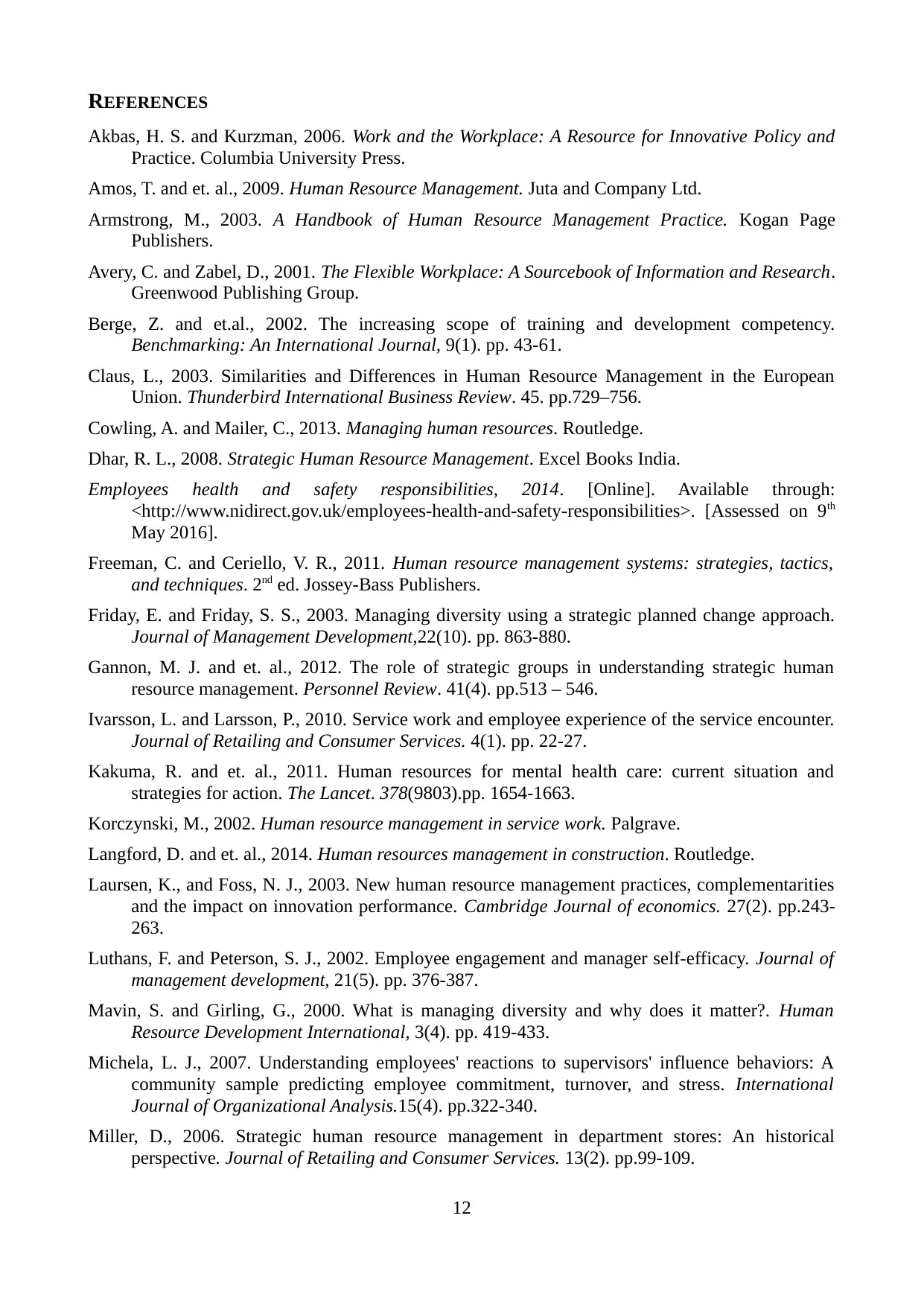
REFERENCES
Akbas, H. S. and Kurzman, 2006. Work and the Workplace: A Resource for Innovative Policy and
Practice. Columbia University Press.
Amos, T. and et. al., 2009. Human Resource Management. Juta and Company Ltd.
Armstrong, M., 2003. A Handbook of Human Resource Management Practice. Kogan Page
Publishers.
Avery, C. and Zabel, D., 2001. The Flexible Workplace: A Sourcebook of Information and Research.
Greenwood Publishing Group.
Berge, Z. and et.al., 2002. The increasing scope of training and development competency.
Benchmarking: An International Journal, 9(1). pp. 43-61.
Claus, L., 2003. Similarities and Differences in Human Resource Management in the European
Union. Thunderbird International Business Review. 45. pp.729–756.
Cowling, A. and Mailer, C., 2013. Managing human resources. Routledge.
Dhar, R. L., 2008. Strategic Human Resource Management. Excel Books India.
Employees health and safety responsibilities, 2014. [Online]. Available through:
<http://www.nidirect.gov.uk/employees-health-and-safety-responsibilities>. [Assessed on 9th
May 2016].
Freeman, C. and Ceriello, V. R., 2011. Human resource management systems: strategies, tactics,
and techniques. 2nd ed. Jossey-Bass Publishers.
Friday, E. and Friday, S. S., 2003. Managing diversity using a strategic planned change approach.
Journal of Management Development,22(10). pp. 863-880.
Gannon, M. J. and et. al., 2012. The role of strategic groups in understanding strategic human
resource management. Personnel Review. 41(4). pp.513 – 546.
Ivarsson, L. and Larsson, P., 2010. Service work and employee experience of the service encounter.
Journal of Retailing and Consumer Services. 4(1). pp. 22-27.
Kakuma, R. and et. al., 2011. Human resources for mental health care: current situation and
strategies for action. The Lancet. 378(9803).pp. 1654-1663.
Korczynski, M., 2002. Human resource management in service work. Palgrave.
Langford, D. and et. al., 2014. Human resources management in construction. Routledge.
Laursen, K., and Foss, N. J., 2003. New human resource management practices, complementarities
and the impact on innovation performance. Cambridge Journal of economics. 27(2). pp.243-
263.
Luthans, F. and Peterson, S. J., 2002. Employee engagement and manager self-efficacy. Journal of
management development, 21(5). pp. 376-387.
Mavin, S. and Girling, G., 2000. What is managing diversity and why does it matter?. Human
Resource Development International, 3(4). pp. 419-433.
Michela, L. J., 2007. Understanding employees' reactions to supervisors' influence behaviors: A
community sample predicting employee commitment, turnover, and stress. International
Journal of Organizational Analysis.15(4). pp.322-340.
Miller, D., 2006. Strategic human resource management in department stores: An historical
perspective. Journal of Retailing and Consumer Services. 13(2). pp.99-109.
12
Akbas, H. S. and Kurzman, 2006. Work and the Workplace: A Resource for Innovative Policy and
Practice. Columbia University Press.
Amos, T. and et. al., 2009. Human Resource Management. Juta and Company Ltd.
Armstrong, M., 2003. A Handbook of Human Resource Management Practice. Kogan Page
Publishers.
Avery, C. and Zabel, D., 2001. The Flexible Workplace: A Sourcebook of Information and Research.
Greenwood Publishing Group.
Berge, Z. and et.al., 2002. The increasing scope of training and development competency.
Benchmarking: An International Journal, 9(1). pp. 43-61.
Claus, L., 2003. Similarities and Differences in Human Resource Management in the European
Union. Thunderbird International Business Review. 45. pp.729–756.
Cowling, A. and Mailer, C., 2013. Managing human resources. Routledge.
Dhar, R. L., 2008. Strategic Human Resource Management. Excel Books India.
Employees health and safety responsibilities, 2014. [Online]. Available through:
<http://www.nidirect.gov.uk/employees-health-and-safety-responsibilities>. [Assessed on 9th
May 2016].
Freeman, C. and Ceriello, V. R., 2011. Human resource management systems: strategies, tactics,
and techniques. 2nd ed. Jossey-Bass Publishers.
Friday, E. and Friday, S. S., 2003. Managing diversity using a strategic planned change approach.
Journal of Management Development,22(10). pp. 863-880.
Gannon, M. J. and et. al., 2012. The role of strategic groups in understanding strategic human
resource management. Personnel Review. 41(4). pp.513 – 546.
Ivarsson, L. and Larsson, P., 2010. Service work and employee experience of the service encounter.
Journal of Retailing and Consumer Services. 4(1). pp. 22-27.
Kakuma, R. and et. al., 2011. Human resources for mental health care: current situation and
strategies for action. The Lancet. 378(9803).pp. 1654-1663.
Korczynski, M., 2002. Human resource management in service work. Palgrave.
Langford, D. and et. al., 2014. Human resources management in construction. Routledge.
Laursen, K., and Foss, N. J., 2003. New human resource management practices, complementarities
and the impact on innovation performance. Cambridge Journal of economics. 27(2). pp.243-
263.
Luthans, F. and Peterson, S. J., 2002. Employee engagement and manager self-efficacy. Journal of
management development, 21(5). pp. 376-387.
Mavin, S. and Girling, G., 2000. What is managing diversity and why does it matter?. Human
Resource Development International, 3(4). pp. 419-433.
Michela, L. J., 2007. Understanding employees' reactions to supervisors' influence behaviors: A
community sample predicting employee commitment, turnover, and stress. International
Journal of Organizational Analysis.15(4). pp.322-340.
Miller, D., 2006. Strategic human resource management in department stores: An historical
perspective. Journal of Retailing and Consumer Services. 13(2). pp.99-109.
12
⊘ This is a preview!⊘
Do you want full access?
Subscribe today to unlock all pages.

Trusted by 1+ million students worldwide
1 out of 13
Related Documents
Your All-in-One AI-Powered Toolkit for Academic Success.
+13062052269
info@desklib.com
Available 24*7 on WhatsApp / Email
![[object Object]](/_next/static/media/star-bottom.7253800d.svg)
Unlock your academic potential
Copyright © 2020–2026 A2Z Services. All Rights Reserved. Developed and managed by ZUCOL.





